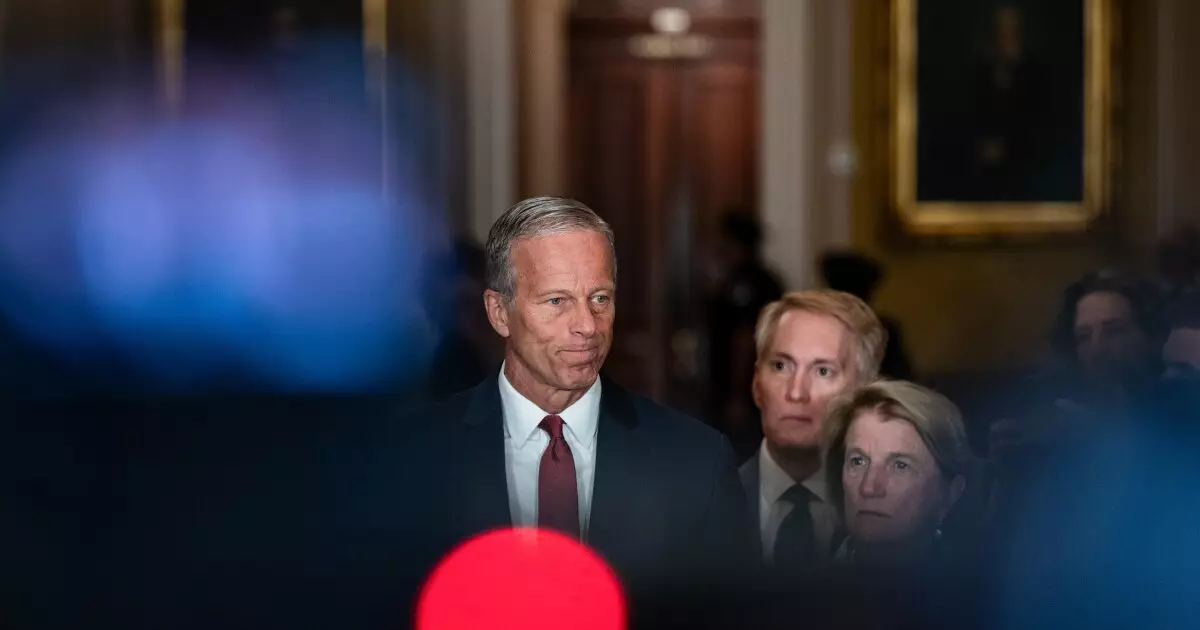The looming budget bill in Congress has sparked contentious debates among Senate Republicans, who are scrambling to shield rural hospitals from devastating Medicaid cuts. To the untrained eye, it may seem purely a fiscal matter; however, the implications extend beyond numbers on a ledger, touching the very fabric of society in rural America. For the GOP, the handling of this issue could either solidify their standing with their constituents or serve as a dire warning against neglecting their most vulnerable populations. Amid all this, the proposed $15 billion relief fund is not merely a temporary fix but a necessary lifeline that should be embraced — before it’s too late.
Recent discussions indicate a growing realization within GOP circles that the proposed cuts are not only politically unpopular but could have grave repercussions for the hospitals that serve as community anchors. States like Kentucky and North Carolina—often conservative strongholds—face cuts that threaten to decimate healthcare access for low-income families. It’s imperative that Senate leaders confront this crisis, as the political ramifications could be severe if rural voters feel abandoned during this legislative maneuvering.
Bypassing the Byrd Rule: A Ticking Time Bomb
It’s no secret that procedural hiccups, such as the Byrd Rule, can bog down even the most well-intentioned legislative efforts. Senate Majority Leader John Thune has repeatedly indicated a preference for adhering to procedural integrity rather than pandering to a few vocal conservatives clamoring to override the parliamentarian’s rulings. While the decision to avoid such a conflict is tactically sound, it raises the question: at what cost?
By sticking to this route, GOP leadership risks alienating constituents who feel that their access to healthcare is being sacrificed on the altar of congressional strategy. The Byrd Rule might limit the ways they can fund rural hospital relief, but it should not serve as an excuse to engage in a norm-defying approach to governance that could undermine the public’s faith in their representatives. Ultimately, Republicans must ask themselves whether punishing the rural hospitals they represent is worth the risk of facing voter backlash.
More Than Just a Number on a Balance Sheet
The proposed allocation of $3 billion annually over five years for rural hospitals is an encouraging signal, but one must remain skeptical about its adequacy. With 48% of rural hospitals reportedly operating at a financial loss in 2023, we should question whether this amount can truly address the deeper systemic issues facing these facilities. The suggestion that these funds will be distributed based on a yet-to-be-determined formula raises further concerns regarding transparency and equity.
These allocations should prioritize those hospitals serving low-income populations while being transparent about how funds are distributed. Without this, the chances are high that the funds will be absorbed inefficiently rather than addressing the needs of the communities they’re designed to help effectively. The inefficacy of handing out funds without a robust analysis of hospital needs could result in a continuation of the cycle of decay in rural healthcare.
The Broader Economic Implications: A Double-Edged Sword
Navigating the complexities of healthcare funding is indeed a high-wire act for the GOP, especially when considering the implications on municipal bonds. Investors are already jittery about the effects of rural hospital cuts combined with tighter budgets. Tapping into this anxiety, Republicans have an opportunity to create a narrative that positions them not only as fiscal conservatives but as champions of the community, ready to support essential services.
With rising yields in healthcare municipal bonds indicating a potential flight of capital from a stressed sector, Republican legislators must recognize that their decisions today will reverberate through local economies. Hospitals are not just healthcare providers; they are often the largest employers in rural areas, meaning their struggles directly impact the livelihoods of countless families.
The Path Forward: The Time for Action is Now
An overarching sense of urgency has gripped these negotiations, and yet it is merely a prelude to what needs to be an inspired set of proactive measures. Embracing the proposed $15 billion relief fund is not just a reactive stance; it is an opportunity for the Senate Republicans to redefine their commitment to all Americans. Failing to adequately address rural hospital concerns risks deepening the fracture between the party and its base.
The path ahead should not be paved with half-measures but rather a concerted effort to integrate healthcare policy into a broader economic agenda that emphasizes rural sustainability. The GOP would be wise to seize this moment—both as a practical necessity and as a means of reaffirming their dedication to constituents who have long felt neglected. The stakes are substantial, and the wandering policies must give way to clear, actionable solutions.

